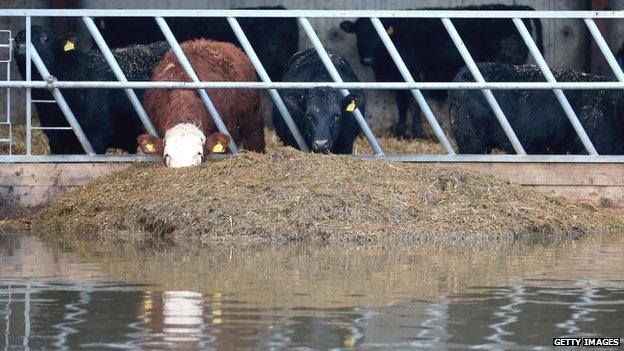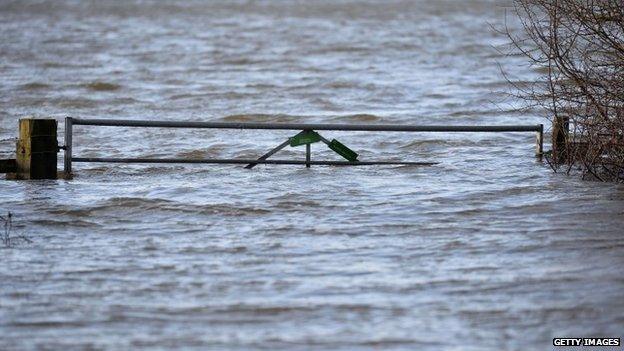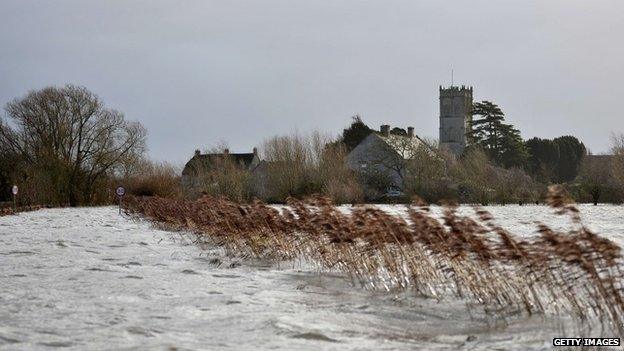Somerset Levels flooded farmers in 'utter despair'
- Published

Some 11,500 hectares of the Somerset Levels are inundated by about 65 million cubic metres of floodwater
The government has ordered a "concrete plan" to deal with persistent flooding on the Somerset Levels, which farmers accuse the Environment Agency of not doing enough to tackle. The reality for one farmer, as the anger continues to rise, is living with up to 90% of 300 acres of land constantly under water.
"It's all a bit bleak," said Heather Venn, a beef farmer around Curry Moor and West Sedgemoor.
She would not reveal the financial cost, but admitted the family had been forced to reorganise its borrowings "significantly" to stay in business.
"It's a huge deal for us," she said. "We are running at a significant overdraft."
The cause is obvious to those living in the county. Currently about 11,500 hectares (28,420 acres) of the Somerset Levels are inundated by about 65 million cubic metres of water.
The Levels are supposed to flood, no-one disputes that, but the water is also supposed to then recede.
For Mrs Venn and her husband Gerald though, their grassland has been flooded since the end of last year.
"It has been underwater for so long what on earth is it gong to be like when the water goes?" she says.
"Is it going to be croppable or not? It is not just about farming now, it's about more than farming. The destruction of farmland."

Farmer Barry Bryer said some flood relief channels in Somerset were only 60% effective
It is a similar picture for Barry Bryer, a dairy and maize farmer with 400 acres around King's Sedgemoor, 50% of which was underwater a fortnight ago.
In 2012, almost a quarter of his land reverted to peat bog, he said, with a friend suggesting the flooding was last this bad in 1929.
"If you have rainfall, you have got to get it out. There are two main arteries - the River Parrett and the Parrett relief channel," he said.
"I liken it to your own heart. If your arteries clog up you have bypass surgery - for us that was the bypass channel - but if they remain clogged up something needs sorting.
"Realistically, you have got to clear the rivers. The Parrett has not been dredged properly for 30 years. Dredging is the only way I know of.
"The channels at the moment are only 60% effective."
According to the tourist board Visit Somerset, the levels are dotted with heritage sites and historic towns, bursting with wildlife and home to a vibrant farming community.
However the community is one in desperate need of help. "Utter despair" is how the National Famers Union (NFU) in the South West puts it.
It says there is a "lack of trust" in the government and the problem can only be overcome by "unblocking the arteries".
NFU regional director Melanie Squires, said: "We must see urgent action by the Environment Agency (EA), backed by Defra ministers, to allocate sufficient resources or the situation, not simply in terms of the damage done to land and property, but also to trust in central government and its agencies will be irreversible."

There are calls on the Environment Agency to take urgent dredging action in Somerset
However, the EA is adamant increased dredging in Somerset would not have prevented the widespread flooding.
"We're doing everything we can to pump water off the Somerset Levels as quickly as river and tide levels allow," said an agency spokesman.
"This is the single largest pumping operation ever undertaken in Somerset."
The agency said £45m was spent nationally in the last financial year on improving rivers, including dredging and weed clearance.
During a visit to the county, Environment Secretary Owen Paterson, said it appeared two rivers needed to be dredged as part of a much wider package of flood relief work.
But for the landowners, the homeowners, the business owners, and the farmers who are surrounded with stagnating floodwater, taking things one day at a time, is the only option.
"Dredging is not the only thing, but if it's not done then we're all going to go under," said Mrs Venn.
"If you don't clear your drains out, the water won't go away."
And there are hundreds in Somerset, who just want the water to drain away.
- Published27 January 2014
- Published27 January 2014
- Published27 January 2014
- Published27 January 2014
- Published27 January 2014
- Published25 January 2014